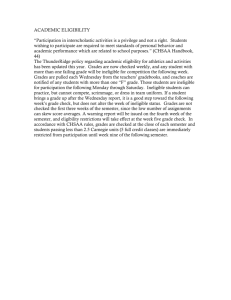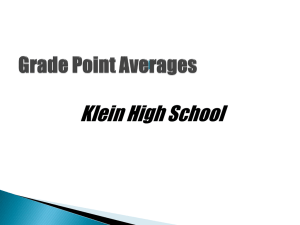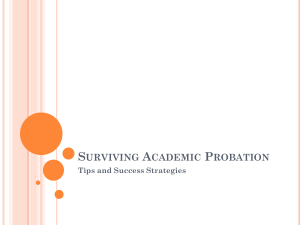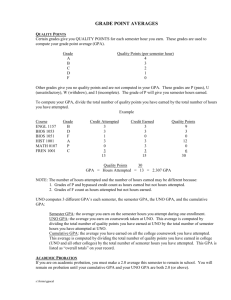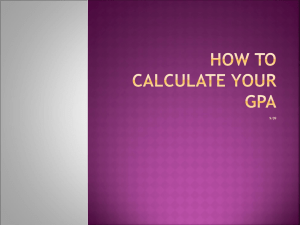VDE - Policy 2436.10 - Participation in extracurricular activities
advertisement
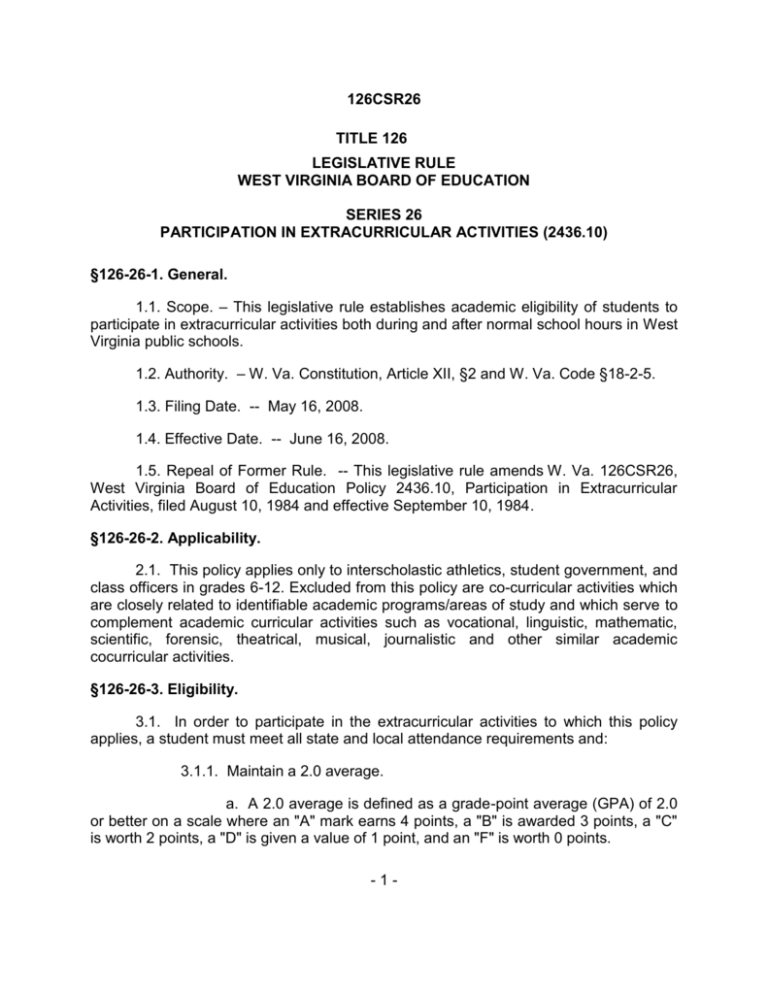
126CSR26 TITLE 126 LEGISLATIVE RULE WEST VIRGINIA BOARD OF EDUCATION SERIES 26 PARTICIPATION IN EXTRACURRICULAR ACTIVITIES (2436.10) §126-26-1. General. 1.1. Scope. – This legislative rule establishes academic eligibility of students to participate in extracurricular activities both during and after normal school hours in West Virginia public schools. 1.2. Authority. – W. Va. Constitution, Article XII, §2 and W. Va. Code §18-2-5. 1.3. Filing Date. -- May 16, 2008. 1.4. Effective Date. -- June 16, 2008. 1.5. Repeal of Former Rule. -- This legislative rule amends W. Va. 126CSR26, West Virginia Board of Education Policy 2436.10, Participation in Extracurricular Activities, filed August 10, 1984 and effective September 10, 1984. §126-26-2. Applicability. 2.1. This policy applies only to interscholastic athletics, student government, and class officers in grades 6-12. Excluded from this policy are co-curricular activities which are closely related to identifiable academic programs/areas of study and which serve to complement academic curricular activities such as vocational, linguistic, mathematic, scientific, forensic, theatrical, musical, journalistic and other similar academic cocurricular activities. §126-26-3. Eligibility. 3.1. In order to participate in the extracurricular activities to which this policy applies, a student must meet all state and local attendance requirements and: 3.1.1. Maintain a 2.0 average. a. A 2.0 average is defined as a grade-point average (GPA) of 2.0 or better on a scale where an "A" mark earns 4 points, a "B" is awarded 3 points, a "C" is worth 2 points, a "D" is given a value of 1 point, and an "F" is worth 0 points. -1- 126CSR26 b. For purposes of achieving the clearest and most uniform application of the policy for those schools which use a numerical grading system, all numerical grades shall be converted to the corresponding letter grade. Each letter grade shall be assigned the appropriate value as set forth above, and the average thereof computed to determine whether the student is eligible. No enhanced value should be given for a "plus" or "minus" designation, such as "B+" or "C-"; all grades with the same letter designation have the same numerical value in the 4.0 scale. c. In computing a student's "grade-point average" (GPA) for purposes of this policy, all subjects undertaken by the student and for which a final grade is recorded are to be considered. Athletic practice may not be counted as a subject. The total number of classes taken is divided into the total number of "grade points" earned to determine the GPA. Classes for which a pass/fail is awarded will be included in computing the GPA only if the student failed the class. d. A student's eligibility will be determined for each semester by his or her GPA the previous semester (or, in schools which do not use the traditional semester approach, during the previous eighteen week period). e. If a student does not maintain a 2.0 average for the semester, he or she will be ineligible for participation for the following semester. Students not meeting eligibility requirements shall be reviewed at the mid-point of the second semester (the nine week point) to determine whether the student has achieved a 2.0 average. f. If a student does not earn a 2.0 average by the end of the second semester, he or she may attend summer school to raise the GPA so that he or she is eligible for participation at the beginning of the next school year. For purposes of computing the GPA after summer school, all of the student's grades from the second semester plus his or her grade from the summer school will be used to determine the GPA. g. A student who has not achieved a 2.0 GPA for the previous semester may have his or her eligibility reinstated at midsemester if the student has attained at least a 2.0 GPA. In schools and/or counties where the traditional semester approach is not used, the nine week point shall be utilized in place of the midsemester. h. In the case of students with exceptionalities as set forth in West Virginia Board of Education Policy 2419, Regulations for the Education of Students with Exceptionalities (W. Va. 126CSR16), if grades are given, all grades received from placements in regular classrooms and special education classrooms should be included when computing the GPA. Exceptional students placed in ungraded programs will be eligible for participation in extracurricular activities if their records indicate that they are making satisfactory progress in meeting the objectives of their individualized education -2- 126CSR26 program (IEP). i. Students who have had a break in public school attendance for any reason may be required to establish eligibility after re-enrollment in the public school. If the county school system accepts the transfer of credits/grades earned in the non-public setting, then those credits/grades shall be used in determining academic eligibility. If the county school system does not accept the transfer of credits/grades earned in the non-public setting, then eligibility must be established after re-enrollment in the public school setting. Eligibility shall be gained at midsemester (nine week point) if the student has attained at least a 2.0 GPA. In schools and/or counties where the traditional semester approach is not used, the nine week point shall be utilized in place of the midsemester. j. Students who are entering public schools or other Secondary Schools Activities Commission (SSAC) member schools for the first time will be eligible for participation as follows: (A) Students who have not earned grades that the receiving school will accept for credit upon transfer will be eligible upon enrollment and must have a 2.0 GPA at the end of the semester in which they enroll to remain eligible. (B) Students who have earned grades that the receiving school will accept for credit upon transfer must have earned a 2.0 GPA in the previous semester to be eligible upon enrollment. If not eligible upon enrollment, the student shall become eligible at the midsemester (nine week point) if the student has attained at least a 2.0 GPA. -3-

